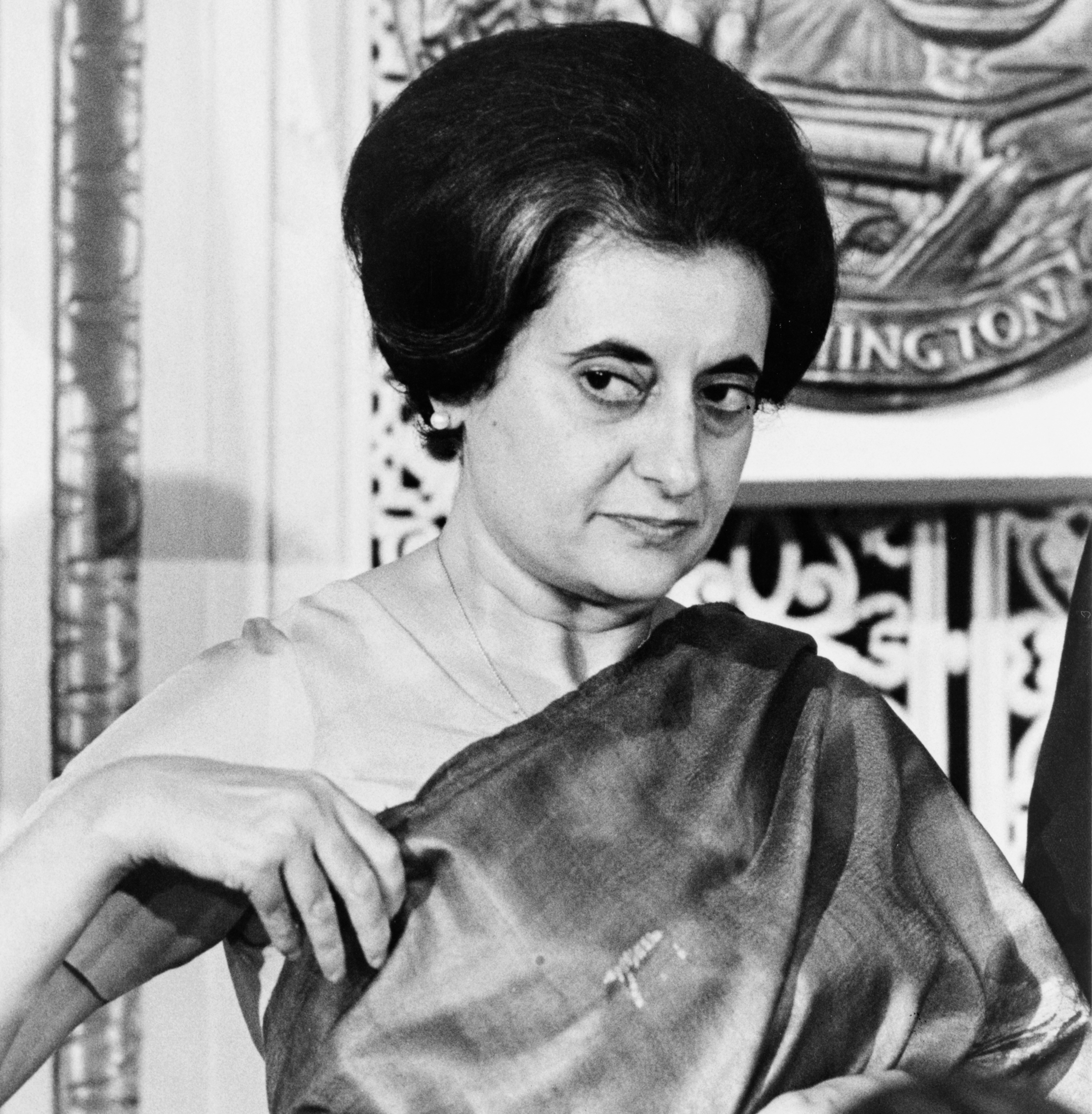Frases célebres de Indíra Gándhí
Variante: Las personas que piensan que no son capaces de hacer algo, no lo harán nunca, aunque tengan las aptitudes
Indíra Gándhí Frases y Citas
Indíra Gándhí: Frases en inglés
“You can't shake hands with a clenched fist.”
Attributed
Variante: You cannot shake hands with a clenched fist.
Luther King" http://gos.sbc.edu/g/gandhi2.html"Martin, speech at the presentation of the Jawaharial Nehru Award for International Understanding to Coretta Scott King in New Delhi, India (January 24, 1969). Published in Selected Speeches and Writings of Indira Gandhi, September 1972-March 1977 (New Delhi : Publications Division, Ministry of Information and Broadcasting, Govt. of India, 1984. pp. 312-313).
Contexto: We admired Dr. King. We felt his loss as our own. The tragedy rekindled memories of the great martyrs of all time who gave their lives so that men might live and grow. We thought of the great men in your own country who fell to the assassin's bullet and of Mahatma Gandhi's martyrdom here in this city, this very month, twenty-one years ago. Such events remain as wounds in the human consciousness, reminding us of battles, yet to be fought and tasks still to be accomplished. We should not mourn for men of high ideals. Rather we should rejoice that we had the privilege of having had them with us, to inspire us by their radiant personalities.
Luther King" http://gos.sbc.edu/g/gandhi2.html"Martin, speech at the presentation of the Jawaharial Nehru Award for International Understanding to Coretta Scott King in New Delhi, India (January 24, 1969). Published in Selected Speeches and Writings of Indira Gandhi, September 1972-March 1977 (New Delhi : Publications Division, Ministry of Information and Broadcasting, Govt. of India, 1984. pp. 312-313).
Contexto: We admired Dr. King. We felt his loss as our own. The tragedy rekindled memories of the great martyrs of all time who gave their lives so that men might live and grow. We thought of the great men in your own country who fell to the assassin's bullet and of Mahatma Gandhi's martyrdom here in this city, this very month, twenty-one years ago. Such events remain as wounds in the human consciousness, reminding us of battles, yet to be fought and tasks still to be accomplished. We should not mourn for men of high ideals. Rather we should rejoice that we had the privilege of having had them with us, to inspire us by their radiant personalities.
"Preface, 4th Five Year Plan" http://planningcommission.nic.in/plans/planrel/fiveyr/4th/4ppre.htm, Government of India Planning Commission (July 18, 1970).
In: Selected Speeches of Indira Gandhi: January 1, 1982-October 30, 1984 http://books.google.com/books?id=ndA3AQAAIAAJ, Publications Division, Ministry of Information and Broadcasting, Government of India, 1986, p. 495.
Her last speech delivered in Orissa on 30 October 1984 before she was assassinated.
“You must learn to be still in the midst of activity and to be vibrantly alive in repose.”
"The Embattled Woman Who Relishes Crosswords, Children...and Running India," People (June 30, 1975).
Letter to Richard Nixon (December 15, 1971) http://www.thehindu.com/thehindu/mag/2005/07/03/stories/2005070300090100.htm.
Fuente: Speech, Bhubaneswar, India (October 30, 1984), quoted in "Death in the Garden," by William E. Smith, Time (November 12, 1984) http://www.time.com/time/magazine/article/0,9171,926929-3,00.html.
“My father was a statesman, I'm a political woman. My father was a saint. I'm not.”
Quoted in "Indira's Coup," profile by Oriana Fallaci, The New York Review of Books (September 18, 1975).
"True Liberation Of Women" http://gos.sbc.edu/g/gandhi1.html, speech, inauguration of the All-India Women's Conference Building Complex in New Delhi, India (March 26, 1980). Published in Selected Speeches and Writings of Indira Gandhi, September 1972-March 1977 (New Delhi: Publications Division, Ministry of Information and Broadcasting, Govt. of India, 1984, pp. 417-418).
Referring to the fundamental rights of "Life, Liberty and the pursuit of Happiness" in the United States Declaration of Independence in a letter to Richard Nixon (December 15, 1971). http://www.thehindu.com/thehindu/mag/2005/07/03/stories/2005070300090100.htm.
Press conference, New Delhi (October 19, 1971), quoted in "Indian and Pakistani Armies Confront Each Other Along Borders" by Sydney H. Schanberg, The New York Times (October 20, 1971), page 6C.
“Dacca is now the free capital of a free country.”
Address to Parliament announcing the victory of Bangladesh-India Forces over the Pakistan Army, (December 16, 1971) http://www.bharat-rakshak.com/1971/Dec16/index.html.
The Mitrokhin Archive
The Mitrokhin Archive
The Mitrokhin Archive
“Indira is India and India is Indira.”
Sidhartha Shankar Ray in: SACRIFICIAL GOATS SCAPEGOATS and GUINEA PIGs: Misadventures and Misrepresentations http://books.google.com/books?id=2HiRtyt2iWEC&pg=PA79, AuthorHouse, 2007, p. 79
Her ardent follower coined this sentence during Emergency.
Sant Harcharan Singh Longowal in: Transforming India http://books.google.com/books?id=reiwAAAAQBAJ&pg=PA28, Harvard University Press, 16 September 2013, p. 28.
Nanaji Deshmukh, Quoted in Friends Of Saffron https://www.outlookindia.com/magazine/story/friends-of-saffron/205424 Outlook Magazine, 27 April 1998
Oriana Fallaci. Interview with Indira Gandhi in New Delhi, February 1972
Oriana Fallaci. Interview with Indira Gandhi in New Delhi, February 1972
Oriana Fallaci. Interview with Indira Gandhi in New Delhi, February 1972
Oriana Fallaci. Interview with Indira Gandhi in New Delhi, February 1972
Oriana Fallaci. Interview with Indira Gandhi in New Delhi, February 1972
Oriana Fallaci. Interview with Indira Gandhi in New Delhi, February 1972
Oriana Fallaci. Interview with Indira Gandhi in New Delhi, February 1972
Oriana Fallaci. Interview with Indira Gandhi in New Delhi, February 1972
